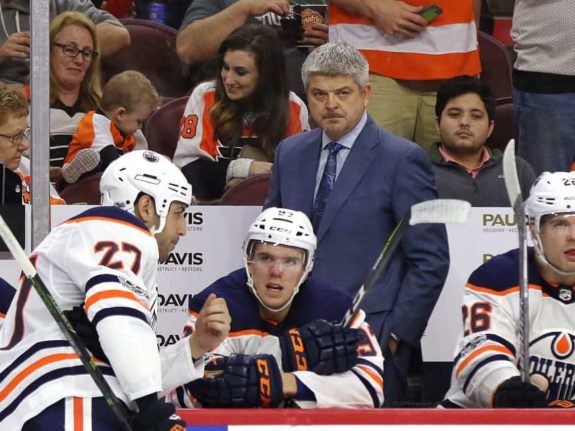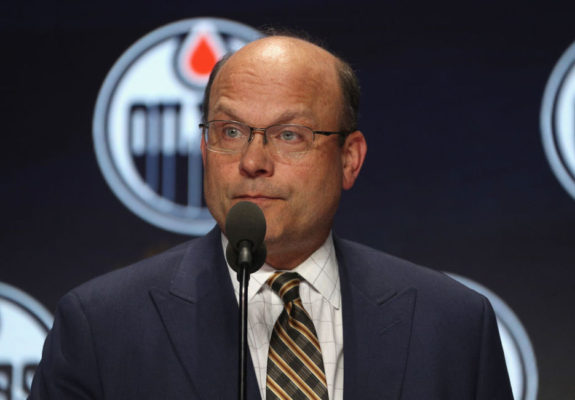The popular thing to do right now is to blame Todd McLellan for the fate of the Edmonton Oilers this season. After an amazing 2016-17 run that saw the Oilers make the postseason for the first time in over a decade, this season has been an unmitigated disaster and the only thing fans are excitedly watching for is the chance that captain Connor McDavid wins the scoring race and potentially the Hart Trophy – two challenges he’ll continue to tackle on Saturday evening as the Oilers take on the Calgary Flames.
With the season all but over and the Oilers about to head golfing for the summer, the organization is rumored to be taking a good, long look at the roster, the coaching staff, the management and other areas that let the team down this season. No doubt, there will be people who lose their jobs. Is one of those people the head coach?
For Firing: McLellan Has No Explanation
If you watch post-game scrums and media interviews, you can tell McLellan is at a loss. He’s unsure as to why the team has performed so poorly and while injuries and personal issues can explain some of the dropoffs, it can’t explain this dramatic a decline.

The power play was horrendous and at times, the penalty killing not much better. Players who performed last season didn’t live up to expectations this season and the sense of desire or passion seemed to be lacking in almost every player but one. McLellan would express his disappointment in the effort level but the team would often not respond and in the NHL, that’s often a sign the coach has lost the room.
Fans have also become increasingly frustrated with the lack of consistency McLellan has shown making lines and finding chemistry between players. Even McDavid said in an interview that the team often doesn’t stick with line combinations long and that it was a treat to build some chemistry with a teammate like Ryan Nugent-Hopkins. It’s hard to excuse the fact that Nugent-Hopkins didn’t get a good look together until the season was well out of reach.
Related: Georges Laraque: What the Heck, Man?
Against Firing: The Coaching Carousel
The Edmonton Oilers, namely Chief Executive Officer and Vice-Chairman of the Oilers Entertainment Group, Bob Nicholson has already come out to suggest that McLellan’s job is safe. Nicholson explained the organization has seen too much turnover and that another major coaching change could and would likely disrupt any momentum gained by having a consistent message, consistent system and consistent communication between players and coaches. There is a valid argument for agreeing with Nicholson.

No team in the NHL has seen as dramatic a coaching and management turnover as the Edmonton Oilers in the last decade. The organization became the laughing stock of the league by bringing in and removing coaches seemingly every season and continuing to finish a lottery team. Yet, this year unlike in year’s past, there is a majority sense this season is an outlier and not a sign of regularity.
Others will argue what has happened here is not McLellan’s fault, but the mismanagement of a general manager who damaged the team and didn’t repair it properly. Those people will contend Peter Chiarelli crippled the organization by making trades the team couldn’t possibly win and that the roster simply wasn’t good enough. No coach, including McLellan, could have made the playoffs with this group.
Related: 5 Options To Replace Oilers GM Peter Chiarelli
The Verdict: McLellan Will Stay
Fans of the Oilers are clearly emotional about how badly this season has gone and will finish. It’s natural to call for someone to take the fall and it’s easy to point fingers at the coach. He may even deserve it.

Still, the Oilers won’t fire McLellan and instead will publicly declare their support for him when the season closes and throughout the summer. Instead, the team will keep a closer eye on Chiarelli who will be expected to fix the problems he overlooked this year. If he doesn’t or can’t, potentially making more mistakes, it won’t be McLellan who goes, it will be Chiarelli. At the very worst, McLellan will be collateral damage at the end of next season if the team doesn’t turn things around in a hurry.